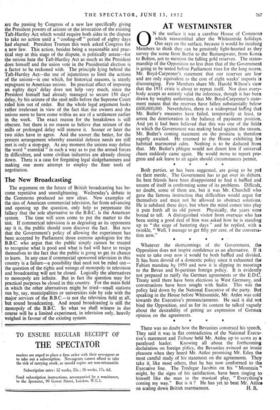AT WESTMINSTER N the surface it was a carefree House
of Commons which reassembled after the Whitsuntide holidays. One says on the surface, because it would be insulting Members to think they can be genuinely light-hearted as they survey the scene from Berlin -to the Bamangwato, from Korea to Bolton, not to mention the falling gold reserves. The states- manship of the Opposition no less than that of the Government is going to be tested before Parliament rises for the long recess. Mr. Boyd-Carpenter's statement that our reserves are low and are only equivalent to the cost of eight weeks' imports is discouraging. Few Members share Mr. Harold Wilson's view that the 1931 crisis is about to repeat itself. Nor does every- body accept as entirely valid the inference, though it has been drawn by weighty authorities, that Mr. Boyd-Carpenter's state- ment means that the reserves have fallen substantially below £600,000,000. Nevertheless, there is a widespread failing that Mr. Butler's measures have failed, temporarily at least, to arrest the deterioration in the balance of payments position. And yet it had been believed that this was one of the fields in which the Government was making head against the stream. Mr. Butler's coming statement on the position is therefore eagerly awaited. He returned to the House exhibiting his habitual marmoreal calm. Nothing is to be deduced from that. Mr. Butler's phlegm would not desert him if universal chaos suddenly came again. He would move to report pro- gress and ask leave to sit again should circumstances permit.
Both parties, as has been suggested, are going to be pui on their mettle, The Government has to get over its dithers. Its best friends have been disappointed to find it baffled and unsure of itself in confronting some of its problems. Difficult. no doubt, some of them are, but it was Mr. Churchill who gave the famous instruction that difficulties would argue for themselves and must not be allowed to obstruct solutions. He is subdued these days, but when the mind comes into play it puts forth all its old power. Physically, the years were bound to tell. A distinguished visitor from overseas who has been seeing a good deal of him was asked how he is standing up to "the siege of battering days" and he replied, with a twinkle, "Well, I manage to get fifty per cent, of the conversa- tion now."
* ' Whatever the shortcomings of the Government, the Opposition does not inspire confidence as an alternative. If it were to take over now it would be both baffled and divided. It has been devoid of a domestic policy since it exhausted the Fabian mandate by 1950 and now it is slipping its moorings to the Bevan and bi-partisan foreign policy. It is evidently not prepared to ratify the German agreements or the E.D.C. Treaty until there have been elections in West Germany, and conversations have been sought with Stalin. This wSs the policy laid down by the National Executive of the party. But speaking in the House before Whitsuntide, Mr. Attlee was cold towards the Executive's pronunciamento. He said it did not bind the Opposition, and as for its content he talked vaguely about the desirability of getting an expression of German opinion on the agreements.
There was no doubt how the Bevanites construed his speech. They said it was in flat contradiction of the National Execu- tive's statement and Tribune held Mr. Attlee up to scorn as a paralysed leader. Knowing all about the forthcoming declaration on foreign [lacy, the Bevanites evinced an ironic pleasure when they heard Mr. Attlee promising Mr. Eden the most careful study of his statement on the agreements. They take it, like most others, that he has now conformed to the Executive line. The Tredegar Jacobin on his " Mountain " might, by the signs of his satisfaction, have been singing to himself like the man in the musical play, "Everything's coming my way." But is it ? He has yet to beat Mr. Attlee on scaling down British rearmament. H. B.


































 Previous page
Previous page